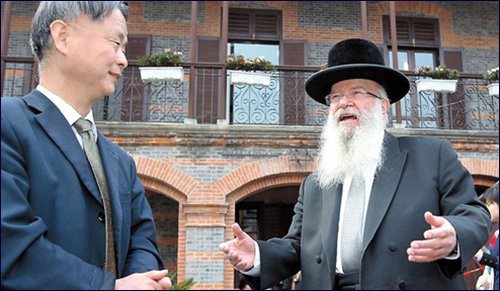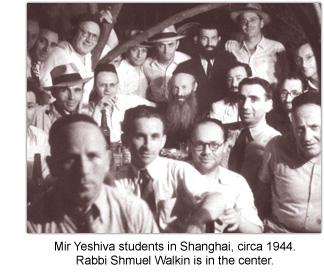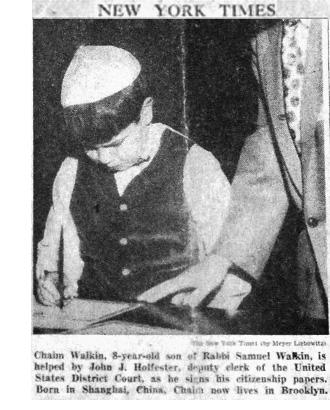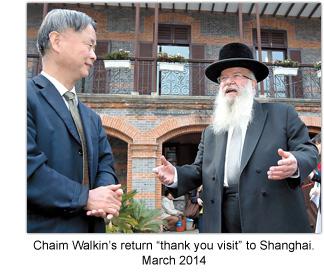 Iran’s Attack on Israel
Iran’s Attack on Israel


6 min read
Born in a Chinese refugee ghetto, Rabbi Chaim Walkin is today a legendary Jewish educator.
It ranks among the most perilous and extraordinary escapes in Jewish history.
In 1939, the small Polish town of Mir, home to one of the world's premier yeshivas, suddenly came under the ruthless Nazi heel. As borders and alliances shifted, the yeshiva students fled to nearby Vilna (Vilnius), Lithuania – only to become ensnared again a few months later, this time behind the Iron Curtain of the brutal, anti-religious Communist regime.
 That's when the miracle began. Japan – which for years had no consulate in Lithuania – in 1940 inexplicably sent Sempo Sugihara, a man with a huge heart and unparalleled courage. Sugihara violated explicit Japanese policy and worked non-stop to issue transit visas whereby thousands of Jews – including 300 Mir yeshiva students – fled across Russia on the Trans-Siberian Railroad.
That's when the miracle began. Japan – which for years had no consulate in Lithuania – in 1940 inexplicably sent Sempo Sugihara, a man with a huge heart and unparalleled courage. Sugihara violated explicit Japanese policy and worked non-stop to issue transit visas whereby thousands of Jews – including 300 Mir yeshiva students – fled across Russia on the Trans-Siberian Railroad.
The month-long exodus ended in Kobe, Japan; in 1943 the students were deported to a Jewish ghetto in Shanghai, China.
Homeless. Stateless. Penniless. How would they survive? And what would become of the Torah scholarship?
The "solution" had been orchestrated 10 years earlier, when a wealthy, assimilated Jew named Silas Hardoon had a dream one night about building a full synagogue complex in Shanghai – complete with seating for 250 people, a kitchen, dining room, and mikveh (ritual bath).
Inexplicably, Hardoon built such a synagogue... which sat unused... until the Mir Yeshiva arrived to find the perfect, predestined home.
It was amidst this "Shanghai Miracle" that Chaim Walkin was born.
Chaim was a scion of a line of great rabbis. His father, Rabbi Shmuel Walkin, a student of the legendary Polish rabbi known as the Chafetz Chaim, became a leader of the Shanghai Jewish refugees.
Torah scholarship thrived in Shanghai. "As low as the humanitarian situation was, the Torah flourished in the face of adversity," Rabbi Walkin told Aish.com from his home in Jerusalem. "They had nothing else but Torah and it produced a golden era."
Shanghai was but a temporary transit stop. In 1946, in the wake of a calamitous world war, the refugees departed for American and Israeli shores.
The Walkins settled in New York, where young Chaim combined innate American sensibilities with premier Torah scholarship. It was this pairing of ingredients that molded him into one of the world's most respected Jewish educators.

Chaim was eight years old when he received American citizenship. "My mother gave me special clothes to wear that day to the courthouse,” he recalls. "To coax me to keep the clothes clean, she said: 'You never know who might be taking pictures.' The next day our neighbor called up and said: 'Buy the New York Times – Chaim's photo is on the front page'."
After his marriage in 1967, Rabbi Walkin made aliyah and reunited with a remnant of Shanghai – the now-flourishing Mir Yeshiva in Jerusalem.
Rabbi Walkin recalls how the yeshiva's dean, Rabbi Chaim Shmuelevitz, expressed intense care and concern for every Jew. "During the 1973 Yom Kippur War, he got up and accosted the yeshiva students: 'If you slept soundly last night, you are cruel! How can you sleep when mothers are anxiously awaiting news of their sons on the front? We must have compassion!'"
When Rabbi Shmulevitz would see an Israeli soldier, "he would stand and look at him in awe," recalls Rabbi Walkin, who instills in his students the importance of "sharing the burden" – by studying Torah with greater intensity and showing appreciation for Israeli soldiers. "They're risking their lives for us," he says. "Showing gratitude and respect is the minimum we should do."
It was at the Mir Yeshiva that Rabbi Walkin first met Rabbi Noah Weinberg. In 1974, when Aish HaTorah opened in the Old City of Jerusalem, Rabbi Weinberg tapped Rabbi Walkin to be the advanced-level Talmud instructor.
"Rav Noach was once-in-a-lifetime phenomenon who gave everything for the Jewish people," Rabbi Walkin says. "My days at Aish were of a unique and lofty caliber. I worked with energetic, idealistic young men. I envied their thirst for truth. They taught me to reevaluate the importance and meaning of Torah."
Since 1989, Rabbi Walkin has been dean of students at the Ateres Yisrael Yeshiva, in the Bayit Ve'gan neighborhood of Jerusalem.
Rabbi Walkin is a sought-after speaker on the topic of education, and his series of essays, The World Within, is regarded as a contemporary classic.
Why do so many people today seem emotionally fragile, and what is the most important advice for parents trying to raise children with healthy self-esteem?
"Unfortunately, many people today are living for the approval of others," Rabbi Walkin says. "The Jewish approach is that a child's self-confidence comes from an awareness that he is a unique, once-in-a-lifetime phenomenon. I am vehemently against imitation. There's an old saying: 'Don't wear borrowed clothes.' Everyone needs to be nurtured and empowered to be an original individual. There is nothing more imperative for a child than to be proud of himself. Accept no imitations!"
 How do parents create a supportive home environment?
How do parents create a supportive home environment?
"My mother spent time in the home of the Chafetz Chaim, where she witnessed an incredible degree of tranquility. They had their share of problems: personal tragedy, financial challenges, anti-Semitism. But nothing negatively affected the house. The Chafetz Chaim's home was always pleasant and positive."
How do we inspire children today to live as proud Jews?
"People are looking for inspiration in genuine, honest, higher values," Rabbi Walkin says. "That's why it's crucial for observant Jews to act with dignified, ethical behavior. It starts with business integrity and extends to all interpersonal contact. Whether going to the post office or riding the bus, every observant Jew is a Torah ambassador. It's up to us."
Rabbi Walkin recalls a recent experience travelling by train in France. "When the conductor came around to collect payment, a man came from a few rows up, held out his credit card and offered to pay for my ticket. I asked him, 'Are you Jewish?' He said: 'No, but I am impressed by your dignity'."
Rabbi Walkin adds: "If only we'd be aware of our power to positively affect others!"
In 2014 – some 70 years after leaving Shanghai – Rabbi Walkin led a delegation of former refugees to visit the Shanghai Jewish Refugee Museum and meet with local officials to say "thank you."
 The city was nothing like the way he left it.
The city was nothing like the way he left it.
Shanghai in the 1940s was largely a run-down, primitive hovel, a paradigm of poverty where Chinese people were literally dying in the streets. Today it is a global financial center and one of the largest cities in the world.
Rabbi Walkin recalls a prophetic moment: "In 1946, before the Mir Yeshiva left Shanghai, there was a farewell party where the Jews thanked the local population for being such good hosts. The rabbis blessed the people that – due to their kindness – Shanghai should flourish and prosper."
Thinking back to the homeless, penniless Jewish refugees who arrived some 70 years ago, Rabbi Walkin exudes pure gratitude. "All the Torah emanating from the Mir Yeshivas today – tens of thousands of students – is thanks to these kind-hearted people. They helped save Judaism. "
